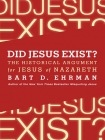Did Jesus Exist? - The Historical Argument for Jesus of Nazareth by Bart Ehrman (ebook reader browser .TXT) 📗

- Author: Bart Ehrman
Book online «Did Jesus Exist? - The Historical Argument for Jesus of Nazareth by Bart Ehrman (ebook reader browser .TXT) 📗». Author Bart Ehrman
Mythicists typically argue that this passage was not originally in Josephus but was inserted by later Christian scribes. Before dealing with that claim I should consider the second passage, the one over which there is the most debate. This passage is known to scholars as the Testimonium Flavianum, that is, the testimony given by Flavius Josephus to the life of Jesus.14 It is the longest reference to Jesus that we have considered so far, and it is by far the most important. In the best manuscripts of Josephus it reads as follows:
At this time there appeared Jesus, a wise man, if indeed one should call him a man. For he was a doer of startling deeds, a teacher of people who receive the truth with pleasure. And he gained a following both among many Jews and among many of Greek origin. He was the messiah. And when Pilate, because of an accusation made by the leading men among us, condemned him to the cross, those who had loved him previously did not cease to do so. For he appeared to them on the third day, living again, just as the divine prophets had spoken of these and countless other wonderous things about him. And up until this very day the tribe of Christians, named after him, has not died out. (Antiquities 18.3.3)
The problems with this passage should be obvious to anyone with even a casual knowledge of Josephus. We know a good deal about him, both from the autobiography that he produced and from other self-references in his writings. He was thoroughly and ineluctably Jewish and certainly never converted to be a follower of Jesus. But this passage contains comments that only a Christian would make: that Jesus was more than a man, that he was the messiah, and that he arose from the dead in fulfillment of the scriptures. In the judgment of most scholars, there is simply no way Josephus the Jew would or could have written such things. So how did these comments get into his writings?
It needs to be remembered that Josephus, by his own admission, was something of a turncoat in the war with Rome. This is how most Jews throughout history have remembered him. Among his own people he was not a beloved author read through the ages. In fact, his writings were transmitted in the Middle Ages not by Jews but by Christians. This shows how we can explain the extraordinary Christian claims about Jesus in this passage. When Christian scribes copied the text, they added a few words here and there to make sure that the reader would get the point. This is that Jesus, the superhuman messiah raised from the dead as the scriptures predicted.
The big question is whether a Christian scribe (or scribes) simply added a few choice Christian additions to the passage or whether the entire thing was produced by a Christian and inserted in an appropriate place in Josephus’s Antiquities.
The majority of scholars of early Judaism, and experts on Josephus, think that it was the former—that one or more Christian scribes “touched up” the passage a bit. If one takes out the obviously Christian comments, the passage may have been rather innocuous, reading something like this:15
At this time there appeared Jesus, a wise man. He was a doer of startling deeds, a teacher of people who receive the truth with pleasure. And he gained a following both among many Jews and among many of Greek origin. When Pilate, because of an accusation made by the leading men among us, condemned him to the cross, those who had loved him previously did not cease to do so. And up until this very day the tribe of Christians, named after him, has not died out.
If this is the original form of the passage, then Josephus had some solid historical information about Jesus’s life: Jesus was known for his wisdom and teaching; he was thought to have done remarkable deeds; he had numerous followers; he was condemned to be crucified by Pontius Pilate because of Jewish accusations brought against him; and he continued to have followers among the Christians after his death.
Mythicists have argued, however, that the entire passage was made up by a Christian author and inserted into the writings of Josephus. If that is the case, then possibly the later reference to James as “the brother of Jesus, who is called the messiah” was also interpolated, in order to reinforce the point of the earlier insertion. One of the fullest arguments for this position is offered by Earl Doherty, both in his original work, The Jesus Puzzle, and in an amplified form in his more recent Jesus: Neither God nor Man. In his view, “a good case can be made for saying that Josephus wrote nothing about Jesus and was probably unaware of any such figure.”16 Doherty mounts argument after argument against the view that Josephus made any reference at all to Jesus, often repeating the arguments of others, sometimes coming up with his own. Here I will consider his most important points.
First, some (such as G. A. Wells) have maintained that if one removes the entire Testimonium from its larger context, the preceding paragraph and the one that follows flow together quite nicely. This one seems, then, intrusive.17 As Doherty rightly notes, however, it was not at all uncommon for ancient





Comments (0)